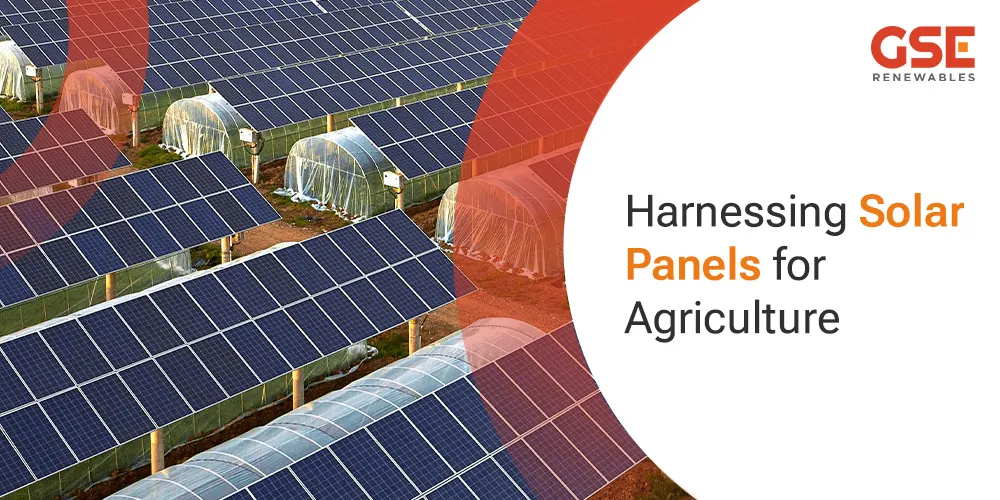500 kW Solar Power Plant Cost in Gujarat: Complete Price & Savings Guide
Nov 26

As the world grapples with the challenges of climate change and energy sustainability, the agricultural sector is also seeking solar energy solutions in India to meet its growing energy demands. One such solution gaining prominence is the integration of solar panels in agriculture. In this blog post, we will delve into the power of solar energy in agriculture, its advantages, types of solar panels suitable for the sector, applications, challenges faced, and future trends and innovations.
Farmers have long possessed a remarkable knack for harnessing and effectively utilizing the abundant solar energy at their disposal. Virtually every facet of agriculture hinges upon the sun’s indispensable role in proficiently converting solar energy into sustenance for various life forms.
In recent times, the escalating costs of electricity have contributed significantly to the burgeoning financial burdens faced by farmers in the United Kingdom and, consequently, the profitability of their agricultural enterprises. Consequently, it should come as no surprise that agricultural practitioners and land
The agricultural industry is no stranger to the reliance on natural resources. With the sun as its primary energy source, agriculture can greatly benefit from solar power. Solar panels convert sunlight into electricity, providing a clean and renewable energy source for various farming activities. This solar energy can be harnessed to power irrigation systems, farm machinery, and even entire farms, reducing reliance on non-renewable energy sources.
Cost Savings: Solar panels can significantly reduce electricity bills, offering long-term cost savings for farmers.
Environmental Benefits: Solar power is clean and reduces greenhouse gas emissions, contributing to a more sustainable agriculture sector.
Energy Independence: Farmers can become less dependent on grid electricity, ensuring a consistent power supply in remote areas.
Diverse Applications: Solar energy can power irrigation pumps, livestock operations, and even the storage of harvested crops.
There are several types of solar panels suitable for agricultural applications. The choice depends on factors like location, space availability, and budget. Common types include monocrystalline, polycrystalline, thin-film, and bifacial solar panels. Farmers can select the most appropriate option based on their specific needs.
Solar panels farm find a wide range of applications in agriculture, including:
Irrigation: Solar-powered irrigation systems ensure consistent water supply for crops.
Farm Operations: Solar energy can be used to power machinery and equipment, reducing operational costs.
Cold Storage: Solar-powered refrigeration units are crucial for preserving harvested crops.
Livestock Farming: Solar panels can provide electricity for heating, lighting, and ventilation in animal housing.
While the benefits of solar panels in agriculture are clear, there are challenges to overcome, such as high initial costs, maintenance requirements, and the intermittency of sunlight. However, advancements in technology and financing options are helping to address these issues.
The future of solar in agriculture looks promising. Innovations like solar trackers, agrivoltaics (combining solar panels with crop cultivation), and improved energy storage solutions are set to revolutionize the sector. Additionally, governments and organizations are offering incentives to encourage more farmers to adopt solar energy.
In conclusion, solar panels are proving to be a game-changer in the agriculture solar system. They offer numerous advantages, including cost savings, environmental benefits, and energy independence. With various types of solar panels available and diverse applications in farming, solar energy is poised to play a significant role in the sustainable development of agriculture. Despite challenges, ongoing innovations and future trends promise an even brighter future for solar panels in agriculture.
As the world looks towards a more sustainable future, harnessing the power of the sun for agriculture is not just a choice but a necessity. GSE Renewables leading solar energy solutions will help you build best solar farm.

Our Blogs With a combined experience of over 250 years and the successful management of 30 MW of solar energy projects, GSER offers the most efficient solutions. 500 kW Solar Power Plant Cost in Gujarat: Complete Price & Savings Guide What is a 500 kW...
Read MoreOur Blogs With a combined experience of over 250 years and the successful management of 30 MW of solar energy projects, GSER offers the most efficient solutions. Why Solar Power Is Booming in Gujarat for Businesses Over the last decade, Gujarat has become one of...
Read MoreOur Blogs With a combined experience of over 250 years and the successful management of 30 MW of solar energy projects, GSER offers the most efficient solutions. Solar Opex Model: For Rooftop Solar with No Upfront Investment What is the OPEX Model in Solar Energy?...
Read More